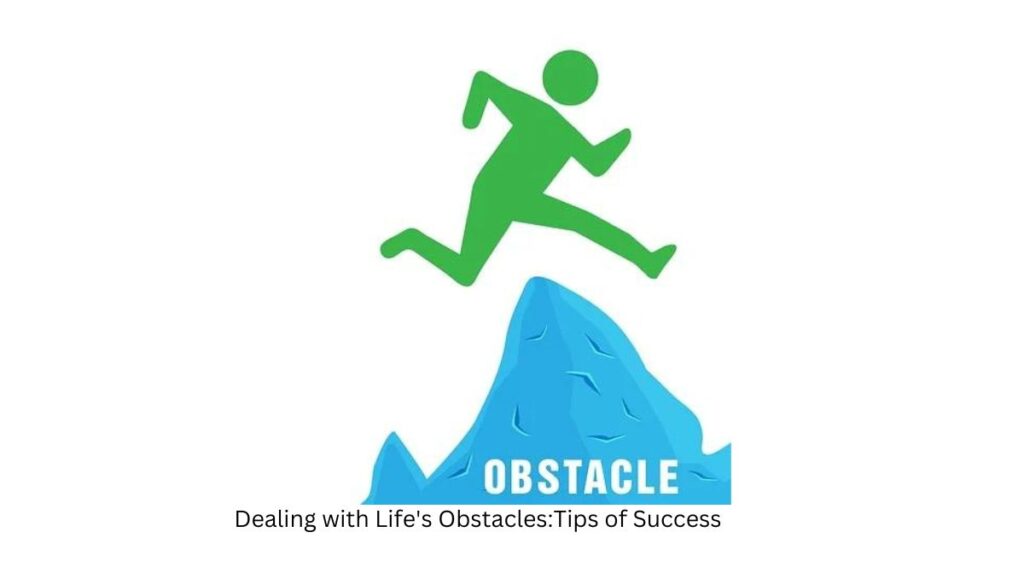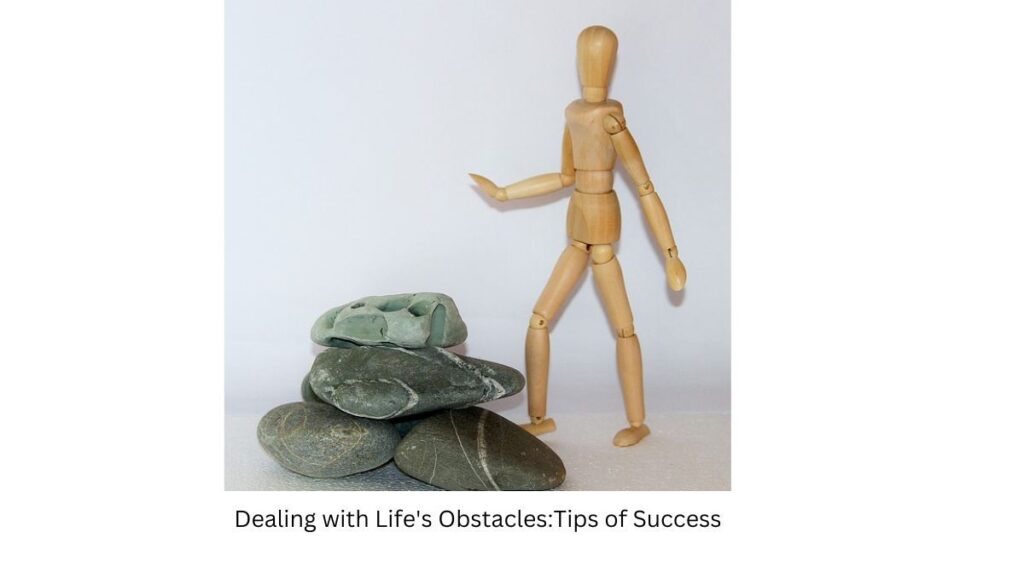Introduction:-
Dealing with Life’s Obstacles: Tips of Success

Life is a journey filled with ups and downs, and obstacles are an inevitable part of this adventure. Whether you’re facing personal, professional, or emotional challenges, learning how to deal with life’s obstacles is key to achieving success and personal growth. In this article, we will explore valuable tips and strategies to help you navigate and overcome life’s hurdles effectively.
How does learning to handle life’s obstacles play a pivotal role in achieving success and fostering personal growth?
- Change Your Perspective

One of the first steps in dealing with life’s obstacles is to change your perspective. Instead of seeing challenges as roadblocks, view them as opportunities for growth. When you approach obstacles with a positive mindset, you empower yourself to find solutions and become more resilient.
- Set Clear Goals
Setting clear and achievable goals can provide you with direction and motivation. Break down your goals into smaller, manageable tasks, and focus on accomplishing them step by step. This approach can make even the most daunting obstacles seem less overwhelming.
- Develop Problem-Solving Skills
Obstacles often require creative problem-solving. Develop your problem-solving skills by analyzing challenges, brainstorming solutions, and considering various perspectives. Don’t be afraid to seek advice or collaborate with others to find innovative solutions.
- Embrace Failure as a Learning Opportunity
Failure is a natural part of life, and it can be a powerful teacher. Instead of fearing failure, embrace it as an opportunity to learn and grow. Reflect on your experiences, identify what went wrong, and use that knowledge to make better choices in the future.
- Stay Persistent and Resilient
Persistence is a key trait when dealing with life’s obstacles. Understand that setbacks are part of the journey, but they don’t define your entire path. Stay resilient, keep moving forward, and remain committed to your goals.
- Seek Support and Guidance
Don’t hesitate to seek support and guidance from friends, family, mentors, or professionals. Sharing your challenges with others can provide you with valuable insights, different perspectives, and emotional support during difficult times.
- Practice Self-Care
Taking care of your physical and mental well-being is essential when facing obstacles. Prioritize self-care activities like regular exercise, a balanced diet, sufficient sleep, and mindfulness practices. A healthy mind and body are better equipped to handle life’s challenges.
- Stay Adaptable
Life is unpredictable, and obstacles can arise unexpectedly. Cultivate adaptability by remaining open to change and flexible in your approach. Adaptability allows you to adjust your plans and strategies as needed, increasing your chances of success.
- Learn from Role Models
Identify role models who have successfully navigated life’s obstacles. Study their journeys, listen to their advice, and draw inspiration from their experiences. Understanding how others have overcome challenges can motivate you to do the same.
- Celebrate Small Victories
While focusing on your long-term goals, don’t forget to celebrate small victories along the way. Recognize and reward yourself for each milestone you achieve, no matter how minor. This positive reinforcement can boost your confidence and motivation.
How do you overcome obstacles to success?
Overcoming obstacles to success involves a combination of strategies and approaches, including:

- Positive Mindset: Cultivate a positive attitude and mindset to face challenges with resilience. Believing in your ability to overcome obstacles is the first step toward success.
- Problem-Solving: Develop strong problem-solving skills to tackle obstacles systematically. Analyze the issue, brainstorm potential solutions, and take action to implement the best course of action.
- Persistence: Maintain unwavering determination and persistence in the face of adversity. Understand that setbacks are part of the journey and view them as opportunities to learn and grow.
- Adaptability: Be adaptable and open to change. Sometimes, the initial plan may not work, and you may need to adjust your approach or find alternative solutions.
- Support Network: Seek support and guidance from friends, family, mentors, or professionals. Sharing your challenges with others can provide you with valuable insights and emotional support.
- Self-Care: Prioritize self-care to maintain your physical and mental well-being. A healthy mind and body are better equipped to handle obstacles and persevere.
What are three steps to overcome obstacles?
To overcome obstacles effectively, consider these three key steps:
- Identify and Analyze: Begin by identifying the obstacle and gaining a clear understanding of its nature and impact on your goals. Analyze the obstacle to determine its root causes and potential solutions.
- Plan and Strategize: Develop a detailed plan to address the obstacle. Break down the problem into smaller, manageable tasks or steps. Consider various strategies and approaches to overcome it, and choose the most suitable one.
- Take Action: Implement your chosen strategy and take decisive action to address the obstacle. Stay persistent and committed to your plan, making adjustments as necessary. Monitor your progress and be open to adapting your approach if needed to achieve your goals.
Why are obstacles important for success?
Obstacles are important for success for several reasons:
- Personal Growth: Overcoming obstacles forces individuals to learn, adapt, and develop new skills. These challenges provide opportunities for personal growth, self-discovery, and increased self-confidence. When people successfully navigate obstacles, they become more resilient and capable of handling future challenges.
- Motivation: Obstacles can serve as powerful motivators. They provide a clear target to strive for, a goal to overcome. The desire to surmount these challenges can drive individuals to work harder, be more focused, and maintain their determination in the pursuit of success.
- Innovation: Obstacles often require creative problem-solving. When faced with a barrier to success, individuals are encouraged to think outside the box, explore new approaches, and innovate. This innovation can lead to improved processes, products, or services and can even open up new opportunities for success.
- Appreciation of Success: Success is more meaningful when it follows a struggle. Overcoming obstacles makes success sweeter and more satisfying. It helps individuals appreciate their achievements and understand the value of their hard work and perseverance.
- Resilience: Dealing with obstacles builds resilience, which is the ability to bounce back from setbacks. Resilient individuals are better equipped to handle adversity and maintain their focus and determination in the face of future challenges.
- Character Development: Facing and overcoming obstacles can shape an individual’s character. It can instill qualities such as determination, patience, persistence, and a strong work ethic. These character traits are often essential for long-term success in various aspects of life.
- Learning Opportunities: Obstacles provide valuable learning experiences. Individuals can gain insights into their strengths and weaknesses, refine their skills, and acquire new knowledge. They can also learn from their mistakes and apply these lessons to future endeavors.
- Building Confidence: Each successful obstacle conquered boosts an individual’s confidence and self-esteem. The more challenges one overcomes, the greater their belief in their abilities, which can positively impact their approach to future endeavors.
- Differentiation: In competitive environments, successfully navigating obstacles can set individuals apart from others. It demonstrates their ability to handle adversity and adapt, making them stand out as capable and reliable.
Conclusion
Dealing with life’s obstacles is an essential skill for personal growth and success. By changing your perspective, setting clear goals, developing problem-solving skills, and embracing failure as a learning opportunity, you can navigate life’s challenges more effectively. Stay persistent, seek support when needed, and prioritize self-care to maintain your physical and mental well-being.
Remember that obstacles are an integral part of life’s journey, and they provide opportunities for growth, resilience, and self-discovery. With the right mindset and strategies, you can overcome these obstacles and continue on the path to success and fulfillment.
Read more
https://youtu.be/BTXik0UUIT0?si=_urqDYPOwXCo4XI3





